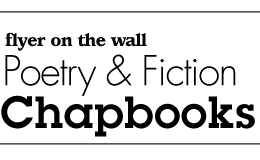
 |
Vol L50th Chapbook Anthology |
JUMP2CONTENTS
Foreword
Bats, Remembered by Peter Blegvad & A Note from the Editors
Part 1
1. The River Road by Abigail Parry, Illustrated by Katie Warner
2. A Room in Paris, 1855 & A Room in Naples, 2005 by Matthew Gregory
4: A Localised History of Dry Precipitation, Europe After the Rain & Olivier by Roddy Lumsden
5: The Precise Moment You Break by Jon Ware
6: When We Were Kings by Declan Ryan, Illustrated by Katie Warner
Part 2
8: '94, No Touching & Year of the Rabbit by Sam Riviere
9: Scenes from a Marriage & The Human Element by Howie Good, Illustrated by Katie Spragg
11: Wolf Shibboleth by Luke Kennard
12: Pheasants by John Clegg, Illustrated by Katie Spraggg
14: Eternity in Gaza by Teresa Chuc Dowell
15: Shapes of Winter by Sam Kinchin-Smith
Part 3
16: Untitled: monument & The Swan’s Reflection: two sides of a postcard by George Szirtes
17: Mr & Mrs Harry Place & James Ryan by Peter Branson
18: The New Year Begins by Corey Mesler, Illustrated by Greer Pester
19: The Groovers Tour Chicago by Jen Spyra
20: lettrism and the choka of graphemes by Desmond Kon Zhicheng-Mingdé
21: Sex = Love by Todd Swift, IIllustrated by Greer Pester
22: The Funeral of the Last of the Genies by James Harringman
23: Detroit Halloween by Nicolas Pillai
25: Elegy with Blood Orange, Orangina Bear & Ralfo's Brother by Jack Underwood
Afterword
Holden Caulfield to J. D. Salinger on the Occasion of the Latter’s Death by Peter Blegvad
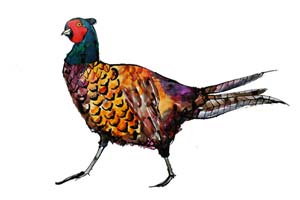
![]()
Foreword
Bats, Remembered by Peter Blegvad & A Note from the Editors
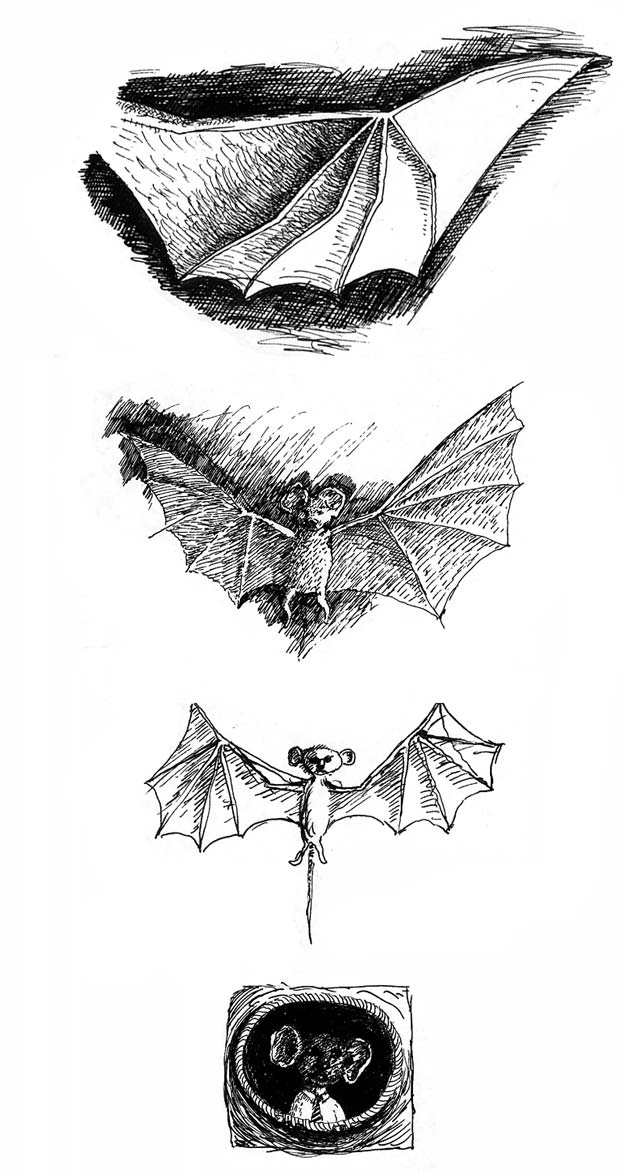
L is our fiftieth chapbook. To celebrate, we’ve put together an illustrated, three-segmented mini-anthology containing work by a number of very different and disparate talents.
Why? Because we wanted to gather together writing by some of our finest contributors to date on a single screen, and publish it alongside the work of both breaking-through and internationally-established individuals that we particularly admire – and we don’t mean ourselves, although we did all slip in a fragment of our own work. Sorry. The result is a poetic abstract, 36 self-contained statements assembled the only way we know how: with a kind of wonky panache. For we don’t mind if six of the poems are illustrated and the rest of them aren’t; we don’t mind that the odd prose piece has wriggled its way into what is very much a poetic monopoly. In fact, we prefer it that way.
Silkworms Ink is about commentary as much as it is about publication. With this in mind, each of our editors will be taking a poem from L and writing about it on Thursday and Friday of this week, creating a conversation between chapbook and blog. If you feel like doing the same, we’d be delighted to receive analysis of 1000 words or less to the usual address, submissions@silkwormsink.com, whether you’re a casual reader or a seasoned Silkworms contributor. We’ll probably publish it. Our door is usually open.
Heartfelt thanks to everybody who donated something to L, and here’s to another 50 chapbooks!
The Silkworms Editors

![]()
The River Road by Abigail Parry, Illustrated by Katie Warner
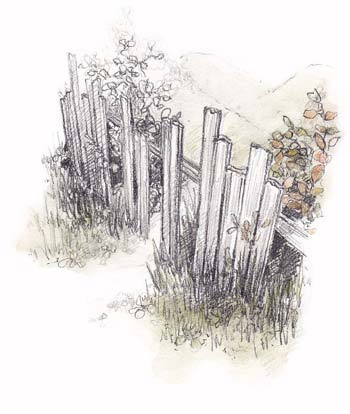
Slip through the fence
Slow, sly
You’ll remember the way.
You can smell a river
A mile away: that weird, dank tug
That is woodpulp, wet stone, rot; that tilts
Your handlebars like a hazel switch.
You know how it goes.
We’ve kept your secrets,
Spelt them out clearly enough:
We have this language, traced
In sprockets and rusted links.
And you know how, here,
Language grows strange, drawn out of you
In a thin brailled ribbon, a dot-dash-dot, a seam
Of sticks and stones
Break my bones
Or a length of road.
And you know
How thoughts cluster in the trees
Or hunker in ditches, ragged
Snatching things, which have nothing to do
With bright rooms, breakfasts, or eggs
Boiling in a milkpan.
How your notional will
Clatters up to the highest branch
To regard you with one yellow eye
Hope to die
And a taste for meat.
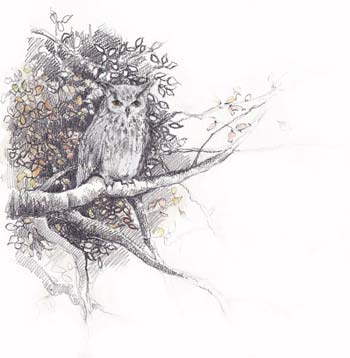
And you know how, here,
Autumn means something other
Than slow-worms, conkers, woodsmoke,
And other comfortable melancholies:
How it pushes tattered fingers
Under the skin, and grips the veins.
And you know how
The tyranny of scales and wheels comes to
Nothing, here:
How shades have liveries
Blood, Rook, Oak
How discord is meaningless
In the brittle timpani of rain, in owl voices,
Splintering twig, the low,
Low, well-mouth O
Of the water;
In the differing pitch of the silences
Of fungus and rust.
And you know, too,
That not even the secret drawer
Of memory is safe: how the pins loosen,
The faces alter, familiar and strange,
Faces in a dream; how their changing expressions
Dimple the glass like pondskaters.
What is it you thought you brought with you?
Stay this time,
Peel back the skin in evening gloves,
Let the sinews unwind, and windblown nerves scatter
Like a fairyclock.
Or else go,
Slip back through the fence, back
To the same street, the stickle-brick trees
And yellow-lit windows, that are
Not the same at all, somehow.
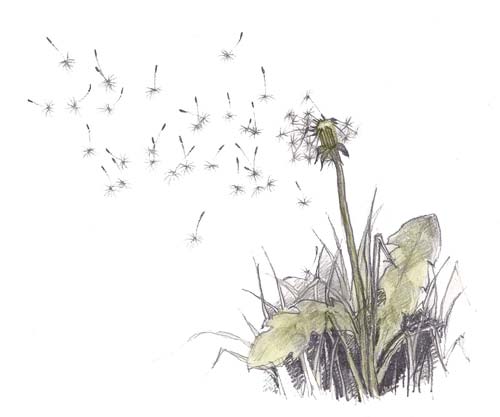
![]()
A Room in Paris, 1855 by Matthew Gregory
From: ‘The Big Room and the Little Room’
An alchemist’s gas lamp
reaches shakily into one corner,
returns with nothing.
Some paintings nobody
has a particular opinion on
are nailed over
rose ballroom wallpaper.
And on the shipwrecked bed
the middle-aged poet,
Gerard de Nerval.
He would appear restful
if it wasn’t for his eyebrows
meeting
like two dark horses
in the middle of his forehead.
He is dreaming
of the beautiful apple
he palmed only a few days before
on Ile Saint Louis
and the grief of a wormhole
in the thing perfected.
He wakes, at an odd angle.
He takes his collection
Les Chimeres
down from its cramped shelf
and cuts it in half at the spine
with a knife.
He will clean
every sentence.
A Room in Naples, 2005 by Matthew Gregory
From: ‘The Big Room and the Little Room’
Lo Spagnolo, unshaven, up in bed
on his last morning as a free man.
Sunlight grids his face on one side
as it enters through the shutters.
Cinematic mist lifts from the hits
his boys left at angles in an alley.
Heavy now, at forty, the bite gone
somewhat from his muscles,
all of his superstitious tattoos wind
to the quiet of the oldcountry.
At this age he’s just started reading -
there’s the unlikely Leopardi
some Monica or Mona gave him
for St Valentines. He tries ‘Sylvia’
though puts it aside when he reaches
‘…where his life was burning out’.
Isabella, beside him, puts out a thigh
with its unfinishable sentence.
He swallows his salve from the poet.
Son of a bitch. Why do they do that.
![]()
<Redacted> by <Redacted>
![]()
A Localised History of Dry Precipitation by Roddy Lumsden
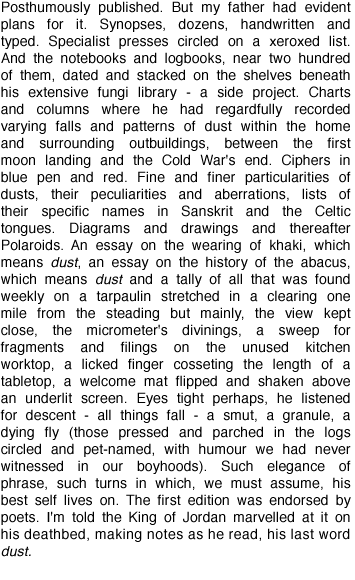
Europe After the Rain by Roddy Lumsden
A possible sin: negotiated peace.
A newly off-duty judge plays a piano,
only on the black keys. The stopgap cab
waits in its stall; you can intuit steam,
silt, soot, any gestural substance.
Honey, the only food which never
rots, lights a pantry with its old glow.
The seamstress works alone, even linen
makes her shrug while the most of us
shiver at its imposterous thrill-feel.
A good man now need not be, say,
honest, rippling. The bank notes turn
magenta, vermillion, cyan, poets' shades
and are pulled from long wallets, lit
and burned: flags, fears, apologies.
The photographer seeks the single
one who has not longed to strip and
wade out, beneath the sea. And for now,
Europe exists as quiet terraces, back
rooms where inner oceans moan.
Olivier by Roddy Lumsden
He married eighty three times, eighty of them in the West End
run of The Good Husband (by playwright Alexander
Morris, who later shot himself and his chocolate Lab - 'une
bufe brune', which survived - in the Place de la Bastille).
He considered calling all his children after the heroines
from the novels of Colette, but had only sons. He was born
in Andalucia where his father was stationed. His favourite
card game was bezique. His favoured wine was best Tokay.
When steak first cost one pound per pound, he noted this
in his diary, which he kept 'fastidiously'. He always carried
an apple in his left coat pocket, for luck, he said, or a rainy
day (which, incidentally, he liked, particularly a monsoon).
At heart, he still considered himself to be plain Mr Oliver,
the trainee gunsmith from Folkestone. He collected packs
of playing cards and also postcards and he loved to receive
them, especially from Mombasa, where he had been born.
He never kept a diary, though he was given one each year
by the Quakers. Once, when they found themselves lost on
the edge of a town, he told my father: Look for the church
tower, and follow on: there is always an inn near a church.
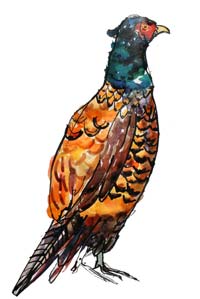
![]()
The Precise Moment You Break by Jon Ware
Lying back across the ottoman, you try to recall the precise moment you broke.
Now, (we say) you simply have to make a choice. This is a game, not a test. We certainly won’t be judging you on the ethical and psychosexual implications of the choice you make. Just play along with us. All you have to do (we say) is play along. I think you’ll be surprised by how much you’ve learnt about yourself once the game’s completed.
You say, “I will.”
You say, “I won’t”. But why would you say that? Try to think about it. You’re not just a spectator any longer. You have a part to play in all of this. Have some thought for the victims of your actions, why don’t you?
*
Your entire town lays out a spread for the soldiers, whose advance seems now inevitable.
Mrs Annabella Gerrard sets up her round trestle-table next to your mother’s low coffee table and then complains that the cloths aren’t matching.
“I don’t want to be judged,” she says, “by your tablecloth. I don’t believe that’s fair to me, Melissa.”
James Patrick Duncan, having woken up at around dawn to discover that he only has stale bread and mince-patties in the house, drives his Volkswagen out towards the out-of-town shopping centre - passing the good Lord knows how many roadblocks on the way - and returns in the late hours of the morning with six or seven heavy plastic bags filled with lardy bacon, Bakewell tarts, cocktail sausages, and the other sorts of treats that soldiers are known to enjoy.
The adults do their best to foster an appropriate sense of fear, gathering into a variety of human circles, talking over one another about the various atrocities reported in the newspapers and debating whether the soldiers will have a need for greengrocers or if they’ll want to bring in their own people.
The children spend the entire morning attempting to ruin this atmosphere by declaring collective carnival. The ten-year-olds begin a brutal, motiveless conflict against the eleven-year-olds on the High Street, lobbing rocks at each other and sheltering behind the upturned bins. The older kids start trying to set the blue rapeseed alight in Andrew Morrison’s northernmost field. Eventually one little boy pushes his luck and steals one Party Ring too many from the tables, and is picked up by his uncle and smacked about repeatedly, the tall bearded man crying out, in sorrow,
“Those are the soldiers’ Party Rings! Those are the soldiers’ Party Rings!”
By lunchtime, the heat has become overbearing and the food has begun to stink. One man, an out-of-towner staying with the Rashids, brings out a portable fridge, dumps it down with a little moan on the edge of the pavement, and begins to load his swiss rolls and lager inside. All of the men, including your own father and Mr Rashid, approach him, one by one – first with bribes, then pleas, then threats, then with bribes again. The out-of-towner sits atop the cool white box, his arms folded, shaking his head with a big false grin.
Every so often someone will glance ostentatiously up towards the Miller household, where the doors have remained shut all day, the curtains drawn. Then, catching someone else’s eye, they’ll mutter a riff on the theme of,
“What are they doing? Don’t they know what’s going on? Do they want to get themselves stood up against a wall and shot? Has anyone told them, d’you think?”
After a while, someone suggests that the Millers are not simply suicidal, but active nihilists; by refusing to pay homage to the soldiers, by showing such obvious disdain, they endanger the entire town. They’ve never liked the town. Someone points out that they only bought their house in the first place because they were gazumped elsewhere.
“Don’t they understand,” says James Patrick Duncan, standing in his vest in the middle of the road, “how society endures? Don’t they even care?”
He wiggles his cigarette, between two thin yellow fingers, in the direction of the Miller house.
Just after two, there’s a little gunfire to the north, which gets everybody very excited. The men talk at some length about the resistance and how we wouldn’t give up without a fight. One fellow in his seventies, a white scar of sunscreen half-rubbed into the small of his naked back, keeps shouting,
“Old Kneeface’ll show ‘em!”
Your father, having made a genuinely impressive reference to the Frith Street manoeuvre, which worked out so well in the early days of the London attacks, looks around for your reaction and is disappointed to discover that you aren’t actually here.
Where are you? For heaven’s sake, where have you got to?
But when the first child dashes back into town and reports that one of his number has been shot dead by the soldiers (outside the copse, in Andrew Morrison’s field, it was louder than in the films, BANG, like that) almost everyone manages to restrict themselves to headshakes and palpable relief that, at last, something happened. The boy’s mother, however - after asking the messenger repeatedly if he’s sure that it was her baby, shaking him by the shoulder and finally calling him a liar, a little fucking liar, just like his father - flies into a terribly fury and begins hurling her own French Fancies out over the mini-roundabout. Two kindly neighbours restrain her as best as they can before leading her away.
Her tableful of food remains untouched for six full minutes before the woman who pours pints at the Green Man strides over and begins to gather up chocolate brownies, plastic cups and Hula Hoops in the base of her blouse. Once she’s dumped all of the bereaved mother’s produce onto her own table, she leans on it, arms crossed, daring any of you to challenge her.
The jeeps don’t come for another hour yet. As the dust trails finally start to kick up, ten or twenty hedges in the distance, Mr Trott begins to sob because his salmon’s turned all to mush.
![]()
When We Were Kings by Declan Ryan
whales swam in our rivers, stranded
and hours from death, or arriving
at it. They were lost, as we are, branded
with an exile’s stamp. Neither thriving
nor heartsick yet, their eyes unable
to adjust to foreign light, striving
for home in a manner their fable-
thirsty rescuers distrusted. Citizens
conversed over breakfast tables
about these lost monsters: impatience
barely concealed as to why these whales
in particular were news-worthy, friends
all of a sudden to the sea-shy, hailed
as martyrs of a sort. The fact remained:
it was in our rivers they had failed.
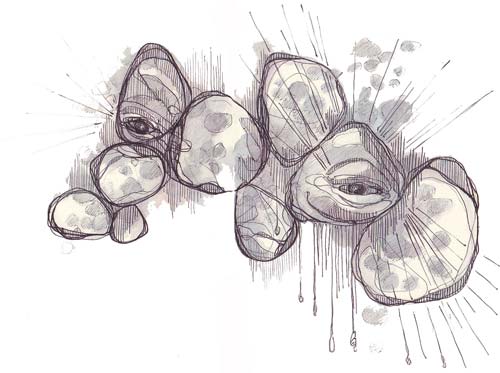
![]()
Untitled by Tom Chivers
My uncle was dispensing financial advice
when the floods came.
I was walking out on the jetty
and frantically closing windows.
He was recommending ISAs, which was strange
as the sun was flat.
I used the colour drop tool to change the sky.
Brickwork was falling and then
I was gripping it in my hands as the road got steeper.
The tree outside Amy’s blossomed
and I looked back below at the tarmac escarpment:
a lupine figure working the vertical treadmill
towards me.
Someone had been sick in the corner.
James was there, in some capacity.
All night I was riding the tops of the trains.
![]()

![]()
'94 by Sam Riviere
From '81 Austerities'
what an amazing year
so many great albums
look it up for yourself
I'd get nostalgic but
unfortunately no-one
around here could care
too much about the 90's
meanwhile you were
what 6 how does that
make you feel it's really
hard to tell now you are
linked to 10000 images
it's funny in my fantasies
I'm the one who dies
you stay here looking as
always excellent in black
No Touching by Sam Riviere
From '81 Austerities'
I would like to alter your life
let it not be said I lack the necessary
imagination to be jealous
I would ask you to tell no-one about us
and if you tell no-one about us
I'll fight hard to hide my disappointment
I would like you to renounce your past
as quite a big mistake
it will mean something although I
will never completely forgive you
I think you represent
the possibility in my life of renewal
I would like people to say
"she came back a different person"
we will appear at the weddings
of people we don't care about
our faces radiant from fucking
Year of the Rabbit by Sam Riviere
From '81 Austerities'
there is no purer form of advertising
than writing a poem
that's what the monk told me
if I were a conceptual artist
I would make high-budget trailers
of john updike novels but no actual movie
the scene where angstrom drives towards
the end of his life down a street in the suburbs
lined with a type of tree he's never bothered
to identify and laden with white blossoms
reflecting slickly in the windscreen
I would fade in the music
as the old song was fading out
keeping the backing vocals at the same distance
kind of balancing the silence
the word RABBIT appears in 10 foot trebuchet
![]()
Scenes from a Marriage by Howie Good
1
We were children together
licked by the dog
with the black tongue
scattered rows
of lighted windows
looking away
a bloody ax
at any given moment
among the tools
in the backyard shed
2
We went to live quietly
except for hunters
and church bells
in one of the rectangle states
a necklace of red berries
discovered around her neck
what I’d been doing until just now
between tiny heart attack
The Human Element by Howie Good, Illustrated by Katie Spragg
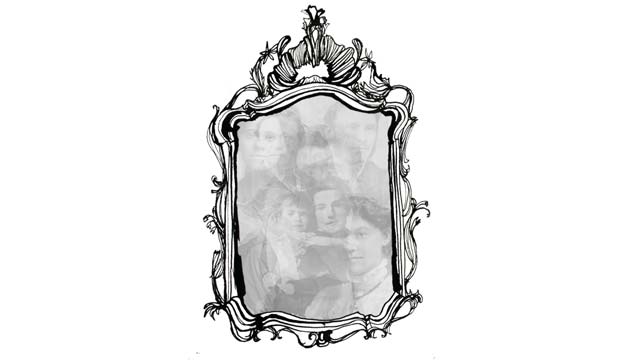
We slip out the door unnoticed. The sky is a soft shade of gray. Only later will we have cause to wonder if the mirror in the hall retains a trace memory of every face it ever reflected. For now, at least, no one uses a word we don’t know. Ghosts of notorious historical figures drift slowly from the smokestacks. Attorney General Palmer. Lord Raglan. There’s nothing on the radio about us or bare, sinister trees marching through the capitals of Europe. We fall asleep holding hands.
![]()
Wulfun Hotel by Liz Berry
Evenin’s the best time fer waiting at the winder
fer someone yer love
as dusk is tossed like a magician’s hanky
over the city’s rooftops,
coverin’ secretaries beltin’ their macs as they dash
for buses, men slippin’
pink-eyed as rabbits from the black hat of the works.
Then night, that owd conjuror,
gaddin’ in wi’ ‘is starry cape and fancy pigeons,
mekkin’ magic of the wenches
chappin it on the cobbles, the lads touchin’ their lips
to the foam of the first pint.
winder/window owd/old mekkin/making
wenches/affectionate term for girls chappin it/flirting or on the pull
![]()
Wolf Shibboleth by Luke Kennard
I Before Annabelle leaves she likens us to newsreaders when the lights dim a semi-tone and the credits roll. ‘You lean over to make a joke so I can say something which looks natural,’ she says. ‘And when it doesn’t work, you throw your clipboard at me.’ ‘You think too much, Annabelle,’ I tell her. I am painting a little pewter figurine of the wolf. I am painting his lips mauve. ‘Besides, I’m tired,’ she says, softly closing the lime-green front door we’ve never stripped. Its click is like a cold chocolate bar snapping. The wolf arrives less than fifteen minutes later. He quickly goes in and out of every room in the house. ‘Again?’ he says. ‘Oh, for the love of God.’ ‘She thinks too much,’ I tell him. ‘Evidently,’ says the wolf. ‘As for me, I have retrained as a phonologist and independent scholar. My next book is to be called The Escapology of Eschatology. Or The Eschatology of Escapology. I’ve not decided yet. There are interviews for a chair at your local university, so if you don’t mind.’ The wolf sets his hat box on top of his steamer trunk and slaps it like a horse.
II ‘In my research so far I have learned that there are two types of “U”,’ says the wolf, ‘“U” and “non-U”. It was originally invented as an after-dinner card game, but people took offence at it something awful. The War, I suppose.’ ‘What on earth are you talking about?’ I fold my copy of How to Solve Cryptic Crosswords over my cryptic crossword. The wolf pours the coffee and says something inaudible. ‘Pardon?’ I say. ‘Oh, very clever,’ says the wolf. ‘“Pardon”, eh? Trying to pass as a chimney sweep, I suppose. The point is, I have worked out,’ he rearranges a bunch of papers and adjusts his spectacles, ‘why you make people so uncomfortable. It is your accent.’ ‘My accent is quite similar to yours,’ I tell him. ‘But mine doesn’t count,’ says the wolf. ‘I have the necessary poise and elegance to pull it off. You’re an Ephraimite, I’m a Gileadite.’ ‘What does that have to do with anything?’ ‘When the world ends, quite a lot, actually,’ says the wolf. ‘I have written a list poem to illustrate my point. It’s not very good – it’s not finished, really. I hate it. Do I have to read it to you?’ ‘I’m sure it’s all right,’ I pat him on the paw. ‘I’m joking,’ says the wolf, ‘it’s fucking brilliant as usual.’
III The wolf assumes his “poetry reading” stance. You have the voice of the oppressor, ‘What do you think?’ he says, twiddling his tail. ‘It’s a bit listy,’ I say. ‘You’re a bit listy,’ says the wolf. ‘Anyway, it doesn’t matter what
IV The wolf and I clean the living room with dusters and wood polish. ‘Anyone can tell you are posh because you have a cheap television,’ ‘That’s as maybe,’ I tell him, ‘but I got my sofa on credit. I’ll still be paying for it in three years.’ ‘And yet you call it a sofa,’ says the wolf. ‘World of Sofas calls it a sofa,’ I protest. ‘Next it’ll be “looking glass” and “chimney piece”,’ says the wolf. ‘Next you’ll be calling the Jack of Clubs the Knave of Collywobbles. You ‘These are all pretty out-dated examples,’ I tell him. ‘Class was invented by the Finnish Journal of Linguistics in 1952,’ ‘The living room.’ ‘You fucking coward,’ says the wolf.
V ‘I’ll talk you through it,’ says the wolf. ‘A history lesson. This will help me practice for my “Chair” interview in a couple of months’ time.’ It is twilight and we are sitting in the living room, which smells like a brand new coffin. We are eating spaghetti carbonara. The wolf has opened a bottle of room-temperature champagne explaining that it is very “non-U” to care about cold drinks. Whenever my eyes rest on a photograph of Annabelle it’s like seeing ‘At one stage it was desirable to imitate the language of your betters,’ ‘Where are you getting this from?’ ‘But now it’s about not wanting to appear privileged,’ the wolf ‘How does that relate?’ ‘You wouldn’t understand,’ says the wolf.
VI ‘At a time of great deprivation, a voice like yours is more than a social embarrassment; it is a liability,’ says the wolf. ‘Therefore it is not so much about saving face as it is about survival. What would you call this steamed pudding? Dessert, I suppose?’ The wolf pours custard out of the mixing jug. ‘It is a pudding,’ I say, ‘but we’re having it for dessert.’ ‘And the overall meal?’ ‘Supper.’ ‘This is a complete disaster,’ spits the wolf. ‘People hear your voice and they want to smash their pint glass and cut out your tongue.’ ‘I’m not sure it’s ever going to come to that,’ I say. ‘You wait,’ says the wolf. ‘You sound like the politicians explaining that we all have to make sacrifices. Say it. Go on. Say it.’ ‘We all have to make sacrifices,’ I say. The wolf opens a fourth bottle of passable Rioja. The cork sounds like a stupid person being mildly surprised. ‘The point is: nobody likes sacrifices,’ says the wolf. ‘Especially human or livestock sacrifices, and furthermore nobody likes politicians – I have observed this on television. Therefore you can be doubly certain that nobody likes you, so it seems to me that you have two choices: downplay or exaggerate your personality.’ ‘Either that or not worry so much about what other people—’ ‘I’m sorry,’ the wolf interrupts, ‘I couldn’t hear you through all of the silver spoons slapping out of your mouth.’
VII We have slept through breakfast so I prepare a nauseating lunch of bloody marys and tomato soup. The combination of ice-cold and piping hot tomato is a unique and ghastly punishment for I know not what. ‘The thing is,’ says the wolf, ‘we’re all the same, really. The “U” is as perfectly miserable drinking a post-opera gin and tonic in his private blimp as the “non-U” is with his pint of bitter in the public house after a long day’s meat packing. My solution is the Democratisation of Hats.’ The wolf produces a silly looking hat. It is red and has several strings attached to miniature games. ‘With everyone wearing the same, cheerful hat, there’ll be no easy way to differentiate and everyone can distract themselves from the human condition with the attached novelties. Also, the hat contains a tiny phial of time-release poison, so that everybody dies of the same disease at exactly the same time.’ ‘It’s brilliant,’ I tell him, stirring half a can of milk into the Campbell’s tomato soup. ‘Sarcasm,’ says the wolf, sadly. ‘It’s all very well for someone like you to make light of it—’ ‘Listen,’ I tell him, ‘In 21st century Britain there are two classes and one of them is homeowners. The rest of us are going to have to ask our landlords’ permission to hang up a painting or have children or to host our own wakes. And the landlords will be all like, “Oh, no, I don’t really want a corpse in my nice clean house, even if it’s only for an afternoon. I’m sure you understand.”’ ‘I’d advise you not to get ideas above your station,’ growls the wolf. ‘Everyone’s going to be dead of poison in forty-four years anyway.’
VIII The wolf is offered and accepts the Chair of Phonology, using me as a case study. ‘Your genius is in combining the worst habits of the “U” and the “non-U”,’ says the wolf. ‘You drink too much, you’re boring, you have a chip and an inverted chip on your shoulder and you harp on and on about both of them, your vocabulary is a little “try-hard”, your enunciation a mixture of out-dated and American sitcom teenager, you’re simultaneously contemptuous and universally sycophantic, you’re snobbish about books, films and music, but you’re dismissive of interior design and architecture, you eat at McDonalds one day and a Michelin starred restaurant the next, you’re capable of being crass and oversensitive in the same sentence, you’re useless with money, you’re desperate for people to like you, even though you secretly hate everyone. I mean, the department loved it. You’re basically a celebrity.’ ‘I’m very happy for you,’ I tell him. ‘Crack open the warm champagne.’ ‘For a mere £9,000 a year, children will learn of the intricacies of the class system from one of the foremost experts in the field.’ says the wolf. ‘A new dawn. I start in September with a six month sabbatical.’
|
![]()
Pheasants by John Clegg, Illustrated by Katie Spragg
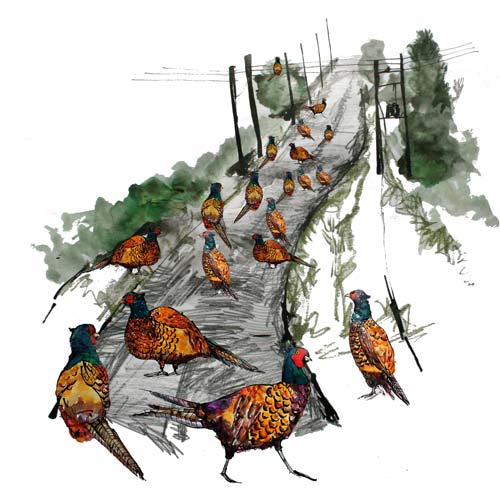
The streetlights blink alive at six
pre-empting the engulfing night.
The access road is overrun
by pheasants, and the new complex
for Astrophysics isn't quite
complete - in fact, it's just begun
and rising so deep in the sticks
they're worried first-year students might
not get there before Graduation.
My Raleigh Hokkaido ticks
between the birds and building site,
the places where the weeds have won,
the crossroad's buried crucifix -
although that metaphor's not right
I can't think of a better one.

![]()
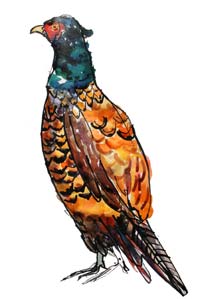
caroline by Rowan Rutter
fell in love with a poet-hobo
who hit that phrase like he was prouder
of his vagrancy than words
but not because of this
or
the slick oysters of ‘baccy spat with
neat perfection into sidewalk cracks;
the ample time he spent crooking her stocking seam
to straighten out her mind;
the romance of the gutters,
or the tumbleweed of time.
but for this, she fell in love for this:
his objection to moonshine
and the ‘monica stuffed selfish-thick with cotton
to stop the wind from picking out a tune
on the broad lonesome of an Alabama afternoon.
![]()
Eternity in Gaza by Teresa Chuc Dowell
Khan Younis Refugee Camp, 2001
When the canisters fell, they were ready,
thinking, "More tear gas", but a white cloud
flowered above, then changed colors and emitted
a sweet odor that made them want to breathe in
the way one breathes in the smell of sweet tea.
The color darkened until it looked like a burning
and people ran to put out what they thought were
fires on their neighbors' rooftops. Muscles began to
cramp up, constricting as if from the bite of a scorpion.
A woman dropped her child as she scratched herself in a fit
of convulsions. A father attempted to hold down
his son who flailed and moaned until he fell into a coma.
The teenagers who played with the canisters, who taunted
their apparent harmlessness, shrieked and shook in pain for weeks.
The doctors had never seen anything like this before. The villagers
had never seen anything like this before. The convulsions came
like waves for an entire month and family who sat and cried at bedside
wailed in pain almost as much as the victims who looked like rabid dogs.
Some visitors were stunned silent, their eyes inward, heads tilted to the side
as if not looking would somehow make it not truly happening.
In a laboratory far away, were beakers, scientists in white gowns and goggles,
microscopes, and gloves. At the end of the day, they went home
to their wives and wives to their husbands. The tables were set,
the dinner was ready, warm and steaming,
and the children swung their legs beneath the table.
![]()
Shapes of Winter by Sam Kinchin-Smith
after Gilbert Sorentino
Or a lack thereof to start with.
I’d saved it up, as with a squinted
climb towards an open place for blinking
– found the biggest window in the house
and snapped the rail with tearing.
Felicity, watching, knows this. The heavier
dust settles. Felicity is a cat. She body
-lines a sad man’s face of track
we both of us latch onto, its neck
and cheek and universe a dumb hanging
light, a lack of decent shading, where
before the lines had been so bright. Or dark,
depending. And thick, like my morning’s
tongue, left to soak in spitted wine and smoke,
when Oliver put his foot through a glass
puddle. Oliver is a blind dog. I picked
up a shard and it slipped into something
boring in my hand. Interjections,
tracks, are more interesting than frozen
weather. Except, that is, my own.
![]()

![]()
Untitled: monument by George Szirtes
1.
Look, they have collapsed. The monuments
have fallen one after the other. Mud
covers them; guts and grit and blood,
so they’re no longer granite but tents
blown inside out, fixed to a feeble stem.
There’s no more life in them.
They are as the world is, large and rough to the touch,
hollow, yet full of air and the lost soul
of whatever created them when it was in control
of itself and its fate. They did not stand for much,
but stood, as now they simply lie,
without ever having taken a formal goodbye.
Imagine the body swollen, covered with tiny hairs
that attract all the flying waste
of the world, the body awkwardly placed
and disposed among rubble, tables and chairs,
left on a tip. The body weakly surrendered
to the elements, never to be mended.
Body in ditch. Body on grass verge. Body curled
around some loved thing. Body cracked
wide open. Body stiff limbed, broken backed.
Body returning itself to the general world.
Body simply aged. Body shocked
into trauma, permanently blocked.
There’s something careless about all this, something
incompetent and botched. If we lack grace
it might be because we’ve never known our place
among the elements. Our words do not wing
their way home but hover in the air,
between haplessness and despair.
So when monuments collapse, we’re not surprised.
The sadness doesn’t last long,
just long enough to improvise a song
or murmur a prayer, something human-sized,
quite the wrong-scale for a monument
erected for at an all-too-large event.
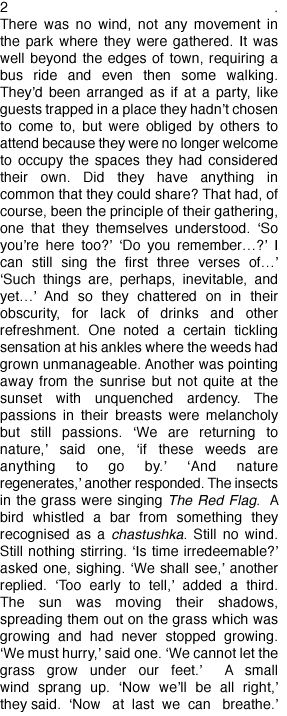
The Swan’s Reflection: two sides of a postcard by George Szirtes
After Caroline Wright
Cygnus (picture side)
I am calligraphy. On salt marsh, on the village pond,
I write my name in arabesques. I speak white
To the cloud and the clouded water.
I am the furthest quarter
Of the starless night
And beyond.
I am breast
And wind and moon
And the sheer distance
Of constellations, the persistence
Of desire, the nebulae of systems soon
To vanish: cry and echo, curvature and rest.
Reverse (message) side
Call now.
The phone is on mute.
There is no speech, no language
Lodged in those empty spaces, no gauge
That can measure a distance so silent and absolute
We cannot address it in words, because we don’t know how.
Listen to the street. The voices in shops, in the bus queue,
On the platform. Something curves back at us,
Some echo, arabesque, a kind of pageant,
Like the rhythms of an imagined
Language: sign, Cygnus,
Me, you.
![]()
Mr & Mrs Harry Place & James Ryan by Peter Branson
Coney Island, New York, February, 1901
‘Raindrops keep falling on my head’
Just as the door to Mr Place’s room
begins to close, you glimpse a pistol in
its holster, sort of thing they use out West.
But mindful of his tip, you think no more
of it, until a few days later, when
you read how Pinkertons have chanced upon
a photograph of members of the Wild
Bunch outlaw gang. And there he is, him with
the classy broad in tow, the Sundance Kid
no less. You recognise the piercing eyes
from the adjacent suite, Butch Cassidy,
would you believe? You dine on him for weeks.
They leave next day, the Argentine, some say.
Whatever, they are never seen again.
![]()
The New Year Begins by Corey Mesler, Illustrated by Greer Pester
The world sits on a rusty axis.
You and I know the lyrics
and we sing as if we mean it.
Everything is in danger
of becoming something else.
The reasons for this are unknown
but the birds still wake
and the seas still churn and
the house sometimes is cold in
the winter and hot in the summer.
But you and I sing anyway.
We know the something-else
may also be gentle. It may, or may not,
be the final resting place, the
one we were promised at our geniture.
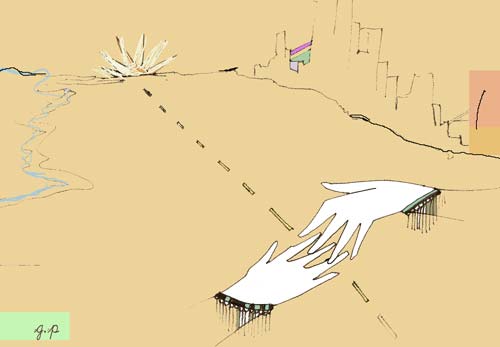
![]()
The Groovers Tour Chicago by Jen Spyra
ELLEN: Good morning and welcome to our cruise of the Chicago River and its architectural landmarks. My name is Ellen and I’ll be your tour guide today. How’s everybody doing? Good. I want you to know that I’m happy for you. I’m not quite as well. I thought you should know.
LUCY GROOVER, age 14: That’s the first few lines of ‘You Oughta Know’ by Alanis Morissette.
ELLEN (fighting back tears): Over the next hour I will recount the dramatic story of Chicago's rise from the Great Fire of 1871, to be the home of the skyscraper and the cradle of modern American...(blows nose loudly and sobs) I'm sorry.
SAM GROOVER, age 16: Are you okay?
ELLEN (beginning to cry): Along the one-hour route, you'll see buildings by world-famous architects including Mies van der Rohe, Skidmore, Owings & Merrill, and Helmut Jahn. Goddammit, Rob, you coward.
MR. GROOVER, age 49: Excuse me?
ELLEN stares into the distance.
MR. GROOVER: We’d just like to learn about the architecture of Chicago.
ELLEN: Why? It’s not gonna last. You think these buildings are special, you think Rob gives a shit about me? They're crumbling as we speak. We’ll be sucked into the river from the force of the implosions...pulverized by the flying debris.
LUCY: But it says in the brochure that this is a fun, safe, and informational tour that will leave us wanting more.
ELLEN: Don’t believe everything you read, kid. Especially emails beginning with ‘listen you crazy witch’.
MR. GROOVER: Hey, this trip to Chicago is costing me a fortune. I’d like my ninety dollars worth out of this tour.
ELLEN: Chicago started off as a lonely prairie town one hundred and eighty-nine years before I met Rob.
SAM: What’s that building over there?
ELLEN: That’s the building that I could see from my office’s break room when I first started dating Rob.
LUCY: The brochure says it’s the Brooks building, built in the style of the Chicago school and designed by Holabird and Roche.
MR. GROOVER: You’ve given us about a quarter’s worth of information so far. I’m sorry about your boyfriend, but could you just do the tour?
ELLEN: Boy. Friend. And yet he was a man, and my lover. Where does language begin?
MR. GROOVER: Forget about language, where does the tour begin? Tell us about Chicago!
ELLEN: Why don’t I dance while I’m at it? Rob was right. ‘They’ll treat you like an animal...they’ll kick you when you’re down.’ He said that at McDuffy’s...just before some ho with a bellybutton ring asked for his number. He gave it to her.
MR. GROOVER: Jesus, this girl has problems.
ELLEN: I know. I was right there! She knew he was my boyfriend – was she raised by wolves?
MR. GROOVER: This is ridiculous.
ELLEN: Yeah! We were gonna go to New York next weekend. I bought the tickets!
MR. GROOVER: I want my money back.
ELLEN:...is exactly what I said. Delta’s weird with refunds.
MR. GROOVER: You’ve given me fifty cents’ worth of information here. Just do the tour!
ELLEN: In the early 1960’s, a ‘Second Chicago School’ emerged, largely due to the ideas of structural engineer Fazlur Khan. He introduced a new system of framed tubes in skyscraper design and construction.
SAM: Has Rob called?
ELLEN: No.
MR. GROOVER (to SAM): Why did you bring that up?
SAM: Well it’s on the table, let’s talk about it.
ELLEN: I thought we'd move in together.
SAM: Did he ever say that?
ELLEN: It was implied.
MR. GROOVER: I just want some information about Chicago architecture.
ELLEN: A common misconception is that Chicago earned the nickname ‘windy city’ because it’s so windy. Not so! Chicago is known as the windy city because – I’m just emotionally bottomed-out.
SAM: Breathe.
MR. GROOVER: Jesus. That bum in a diaper who screamed at us outside of the popcorn shop could have told us more about Chicago.
ELLEN: He texted me last night. He told me to never call him again.
LUCY: Who, the bum?
MR. GROOVER and ELLEN: No, Rob!
SAM: I can’t believe Rob would do that. What’s his sign?
ELLEN: Capricorn.
SAM: And you’re a water sign?
ELLEN: Yes.
SAM sharply intakes breath.
MR. GROOVER: Please, stop talking about Rob. Just tell us something about this river. Anything!
ELLEN: Rob threw his cell phone in it for a dare. That’s so Rob.
MR. GROOVER: I’m talking to your manager about a refund when we get back.
ELLEN: I’m the manager.
MR. GROOVER: Well then, I’m talking to Rob.
ELLEN and SAM: You can’t!
MR. GROOVER: What’s his number? He owes me the ninety bucks I dumped into this tour.
ELLEN: 773-527-0909. But there's no point. He’s not answering his phone!
MR.GROOVER: (calls; gets voicemail) Goddammit, Rob!
SAM: Classic Rob.
MR. GROOVER (wounded): I just wanted to talk to him for a minute.
BEAT
MR. GROOVER: He sounds like an asshole on his voicemail.
ELLEN: Uh, duh.
BEAT
MR. GROOVER: He could have picked up.
ELLEN: Rob screens everyone.
BEAT
MR. GROOVER: I thought I was different.
SAM: Dad, you are.
ELLEN: Well – if you’ll look to your left, you’ll notice a granite building that seems to jut up from–
MR.GROOVER: Hold on. I can’t concentrate. I’m so pissed at Rob.
LUCY: Didn’t Rob throw his phone in the river for a dare? Maybe he didn’t get a new one.
MR. GROOVER: Oh please. Rob, without a cell? Please.
SAM (to MR. GROOVER): Look at me. He’s not worth it.
ELLEN: Trust me, he doesn’t deserve to talk to you.
MR.GROOVER (fighting back tears): Whatever.
SAM (to MR. GROOVER): Let’s just learn something about Chicago.
MR. GROOVER dials Rob’s number and gets his voicemail; he slumps in disappointment.
SAM: Even if he picks up, what good would come of it?
MR. GROOVER: If he just hears my voice–
LUCY: Maybe he was talking to the ho with the bellybutton ring who asked for his number at McDuffy’s.
MR. GROOVER (erupting): An older version of me? Is she perverted like me? Would she go down on him in a theater? Does she speak eloquently? And would she have his baby? I’m sure she’d make a really excellent mother.
ELLEN: Sir, uh – you can have a refund. I’m sorry that this has been–
MR. GROOVER runs to the prow of the ship, climbs onto the railing, throws his head back and flings his arms to the sides.
MR. GROOVER: Cause the love that he gave that we made wasn't able to make it enough for him to be open wide, no!
ANOTHER PASSENGER: Can I have a refund too?
MR. GROOVER: And every time he speaks her name does she know how he told me he'd hold me until he died, till he died, but he's still alive!
BEAT
LUCY: Look! A rainbow!
ELLEN, MR. GROOVER, LUCY and SAM look at the rainbow.
![]()
lettrism and the choka of graphemes by Desmond Kon Zhicheng-Mingdé
feelings like standing
in grasslands, plateau afield
this day windless and whipping
feelings of love spells rising
plying, pillion-high senseless
yet defiant –
levitate, hover: in stasis
ceil tear caught on camera
portage ice
noir light from behind
![]()
Sex = Love by Todd Swift, Illustrated by Greer Pester
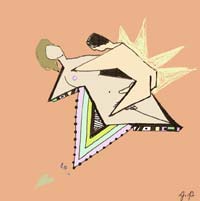
Didn’t know how to love
Go back in time
King bandager
Doctor of Closets
I sat in balls for days
While the world rained
I want my mummy
I want my tummy back
I don’t want your sexy attack
This time make it nice
Finding it hard to locate love
Satnav won’t work like that
Solar flares
Been hurting so long
Beginning to feel like aspirin to me
Good little fuck Nazi
I want to have love but all I get
Is this lousy porn
My hands are a lake of cum
I am a rowing champion
Tell me when God is coming
I can’t wait to be licked clean
Don’t know how to be loved
I’d kill myself first but
I promised to get revenge
Don’t know how to love Thee
I would give you all
My shitty innocence
To be able to love us cleanly
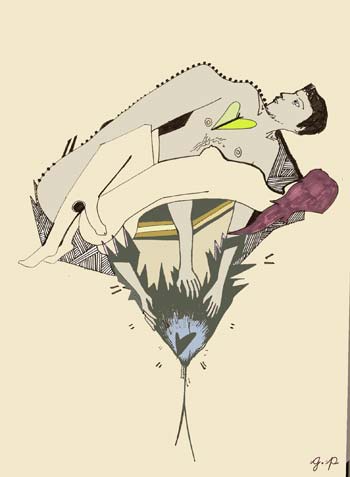
![]()
The Funeral of the Last of the Genies by James Harringman
Moon, Sun,
Dusk, Earth and Sea
convened at the nadir
to exchange their solemnities.
Wind pulled in
dressed up as spinning mistletoe,
composed as she could be
concealing her sad humidity.
She carried the lamp.
The lid was lifted away
and the corpse picked out.
It fluttered with the sermon of the breeze.
A withered parachute of a creature,
The Last of the Genies.
It swallowed air
through the spaces where senses once laid,
billowed as a sack of moth-wing skin,
with the dust of eyes and tongue
sifted to the feet and drifting away.
It floated off like foundation on a ghost
revealing the exact curvature of Wind.
So it came to be that the last wish of the Genie
was bestowed upon itself:
to make Wind blush.
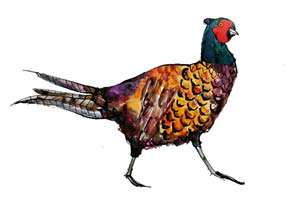
![]()
Detroit Halloween by Nicolas Pillai
The cab driver hadn’t heard of the hotel, which should have been my first warning.
As we circled the block, Terrence told me how he’d hacked all of his life. Some fares wouldn’t get into his cab because he was black, he said. Courage was what this city needed, he said. And he spoke with pride about young white girls who went to work every morning with their heads held high, enduring the jeers of the corner boys. He watched my responses in his rear-view mirror. On the radio, Little Stevie was wailing, “Where did it go, that yester-glow?”
It was my first time in America. I’d expected crowds, and the bustle of industry. But as we drove by Comerica Park, the streets were empty. I thought back to the eighty-foot Uniroyal tyre at the side of the freeway, a rustbelt monolith.
“This used to be a great city,” said Terrence, pointing. “You see that? Comerica Park. But before that there was Tiger Stadium. Real old world glamour, you know? You’d see the ball players sitting outside the bars in the evening, drinking with the fans.”
I leaned forward. “Some of these buildings are just amazing.”
“Uh-huh. Once.” We turned onto Madison, with the Music Hall on our left. “But the riots ruined everything. All the small businesses moved away, never came back. And now the factories.”
“I read about that. The – uh – race problems.”
We stopped at the sidewalk and Terrance chuckled. “You’ll have to excuse the profanity, sir. But there’s black folks, and there’s ni-”
I jumped out of the cab nervously and noisily. As I paid him, he flipped a business card back at me.
“You need a cab, you give me a call. Don’t go out walking in Detroit.”
…my heart went out to play, but in the game I lost you…
It was five minutes on foot to Greektown.
My hotel had been a crashing disappointment. The photos online had made it look like the Flatiron Building. In reality, it was more like the Barton Fink building. The lift had rattled, clicked and shuddered on its way up to my room. I couldn’t see the TV from the bed. The view from the window was of a multi-story car park. I took the stairs back down to street level.
Downtown Detroit was eerily quiet. The only sound came from an empty L-train clattering overhead, the only movement the steam of the sewer grates. I stepped through the vapour, tightening my jaw like Sterling Hayden. I was in a film noir. I was in a war movie, or a zombie movie. I was in an abandoned city.
Wild flowers shuddered in broken windows and the lights came on outside a neglected strip joint. As I got closer to Monroe Street, I saw ragged shadows staggering through empty lots, carrying their lives in plastic bags.
A convenience store sold me six bottles of imported stout. On my way back to the hotel, I passed the police station, clutching the bottles to my chest so they wouldn’t clink.
I drank them quickly in my room and fell into a dreamless sleep.
…makes me want to holler, the way they do my life…make me want to holler, way they do my life…
Every one of the academics around the table agreed that the Westin Book Cadillac was the most luxurious hotel they’d ever stayed in. We had a central table in the upstairs bar, so no-one had to look out of the windows. I felt a million miles away from my shabby room.
My company was a Canadian tweed (in his forties), a fragrant young Ohioan (twentyish), a raddled lush (god knows) and the conference’s organiser (about twelve). The Canadian was holding forth on his journey across the border. He’d taken a Greyhound down from Toronto. Apparently it was the first time his cabbie had taken a fare from the bus station to the Westin.
There was polite laughter, except from the lush, who belched. I tried to start a conversation about Berry Gordy but she told me I wasn’t qualified to speak unless I’d lived through the ‘sixties. She called me a “little shit”, affectionately. I made my excuses and left.
On an impulse, I stopped at a payphone and called Terrence. I sauntered through the lobby and smoked a cigarette on the kerb, avoiding the doorman's stare. A drunk stumbled past and was shooed onwards.
I was grateful for the darkness of the cab, and the advice of Terrence. He knew where to take me, a bar that would let me smoke indoors and drink until two. It was called The Cuba, and it was staggering distance from my hotel. Terrence wished me luck and drove home to his family.
When did you stop loving me? When did I stop loving you?
I'd tied one on with a guitarist named Paolo. He’d once lived in London with a nurse who stole drugs from her hospital. “Crazy town, man,” he chuckled.
Invulnerable from the booze, I swaggered home. At a crossroads, I fumbled in my pocket for a final smoke. A stoplight clanged, and a Corvette pulled up at my side.
From the driver’s window, a luminescent skull smiled at me. I stood frozen in my tracks, the cigarette hanging unlit from the corner of my mouth. And the skull sang,
…so take a good look at my face, you’ll see my smile seems out of place, if you look closer it’s easy to trace…
The Corvette roared away but the skull remained, inscribed in wax and burnt onto celluloid.
Twelve hours later, I gave my paper in Conference Room B of the Westin. Once upon a time, it had been a grand ballroom but commerce had driven away the dancing and the music. Now the commerce had gone too.
There were only five people in my audience, but the room felt even emptier than that. With my back to the window, I could try to forget the ghosts outside, clamouring for remembrance, dragging their nails across the tinted glass.
Instead, I thought of Terrence and the girls who went to work every morning. Speramus meliora; resurget cineribus - we hope for better things; it will rise from the ashes. I cleared my throat and asked for questions.
![]()
Elysium by Ahren Warner
As, at Alesia, Gaieus licked
the Gauls,
Mackerel would fillet Beckett
with his canif.
And, as Vercingétorix
was laid low,
at Alesia Beckett slumps
near the metro.
Above, Radnitzky shoots
a young Artaud,
Tichenor, Messrs. Joyce
and Cocteau
while Beckett hangs in there
by a fīlum,
slouched and spilling claret,
barely vif
but lives, of course, to earn
his laurels
unlike Vercingétorix who,
rubbing his galls,
dawdles among the asphodels,
eyeing the next field on.
![]()
Elegy with Blood Orange by Jack Underwood
I stopped filing my certificates and went
to the window. Nothing out there but glass
against the air, the garden all in place.
But planted like a thumb on the far wall,
a blood orange. Oranges are to do
with hands; they don’t fit in anything else
so I knew this one belonged to you
–a blood-filled index of your not being,
a bright and bitter ball in the dark,
obscured from the field of everyday feeling.
Your sad, handless, orange, I’ve slowly
been unpeeling, for how long is it now.
Orangina Bear by Jack Underwood
I drink his drink because as a child
the droplet bottle, dimpled glass,
flecks of pith and gazeuse fizz
symbolised the foreign, des autrés.
Now in his dank shed, in a river region,
I drink his drink because if I don’t
he will dance at me again, or worse,
lift the fig leaf that man put there,
a regretful afterthought, for they built
Bear as a hub of sex and muscle,
chiselled and halved. When he flexes
and pumps and says Just another kiss
I am sick to a rawness. He hardens.
Boys like you are born giving up.
How long will he keep me here?
My tongue is yellow and stuck.
Ralfo’s Brother by Jack Underwood
Somebody shouted he was in the tree,
so we blasted and he fell like an ape.
His hand smudged at his lapel,
a hole above the knee was gulping.
A leaf settled on his head and he said
“I wish my brother Ralfo was here,
with his rough wood knuckles
and landlord’s voice. By god he’d set you!”
After the perimeter checks and the parakeets
were packed back in the trees,
the jungle lay down to sleep
in green mist. A lone Baboon kept watch.
Ralfo took root, grew from the earth,
tore through the floor of my tent:
his eyebrows were tensed like a slingshot,
his nostrils wide as his eyes!
![]()
Afterword
Holden Caulfield to J. D. Salinger on the Occasion of the Latter’s Death by Peter Blegvad
Boy, you pulled a fast one this time. Congratulations. I bet a lot of people thought you'd been dead for years and managed to keep it a secret. And now it's in the funny papers, it's official.
So bon voyage, and thanks for everything, I guess. I mean I guess I should be grateful. You gave me eyes to see, and a tongue to say what I saw - even if what I saw was so goddam obvious it frankly amazes me that more people didn't see it. I mean the emptiness of everything, the BIG LIE we're all expected to swallow. But nobody notices anything. It's like they're walking around blindfolded or with a caul over their faces like some fetuses are born with.
I was going to say "it's been real." But, actually, it's been fiction. Which is not to say it wasn't true.
Last year I heard you blocked publication of a novel in which I was an old man.
Thanks. I guess.
Now I'll just stay Holden Caulfield, 17, forever – I'll never lose my goddam virginity. I'll never reach maturity.
You, on the other hand, made 91. Were you glad you didn't blow your brains out early on like another of your characters did? You wrote about it like someone who'd been tempted.
To blow your brains out, I mean.
I'm not complaining. The maturity Mr. Antolini predicted for me wouldn't have been so goddam great anyway. He pictured me drunk and sneering at people in some bar or sitting in some business office throwing paper clips at a stenographer. I guess I'm grateful to have been spared all that.
Part of the BIG LIE is that maturity is going to be some kind of Shangri-la, where our dreams will come true and all that crap.
But what if your dream is to be a writer and to have your stories published in some magazine, and then to write a best seller which makes you rich and famous and it does all come true and it's hell on earth?
That would make a pretty damn good story, don't you think?
You once said, and I quote: "Jerry Lewis tried for years to get his hands on the part of Holden." You don't say which part of me, but I'm glad you refused. And one of your exes said "The only person who might ever have played Holden Caulfield would have been J. D. Salinger."
Mr. Antolini tried to get his hands on part of me. But maybe I made too much of a big deal about that. He did offer another prediction which I always found consoling – that I'd keep a record of my troubles and that someone might one day learn something from it all.
Well, obviously, you did that. And if I helped, I'm grateful. As all the people who learned something from us are grateful.
I hope to hell when I die somebody has sense enough to just dump me in the river or something. Anything except sticking me in a goddam cemetery. People coming and putting a bunch of flowers on your stomach on Sunday, and all that crap. Who wants flowers when you're dead?
I'm sure you don't.
So this is just to say goodbye, I guess. And sure, why not? Thanks.
Originally featured on BBC Radio 4
![]()
Cast List
Read more of Abigal Parry here
Read more of Ahren Warner here
Read more of Corey Mesler here
Read more of Declan Ryan here
Read more of Desmond Kon Zhicheng-Mingdé here
Read more of George Szirtes here
Read more of Howie Good here
Read more of Jack Underwood here
Read more of Jen Spyra here
Read more of John Clegg here
Read more of Liz Berry here
Read more of Luke Kennard here
Read more of Matthew Gregory here
Read more of Peter Blegvad here
Read more of Peter Branson here
Read more of Roddy Lumsden here
Read more of Sam Riviere here
Read more of Teresa Chuc Dowell here
Read more of Todd Swift here
Read more of Tom Chivers here
See more from Greer Pester here
See more from Katie Spragg here
See more from Katie Warner nowhere, at the moment, but a website is in the pipeline

